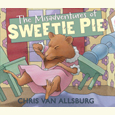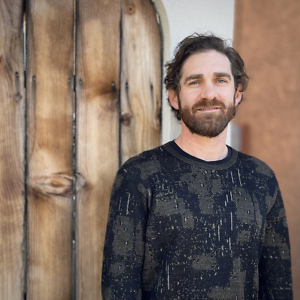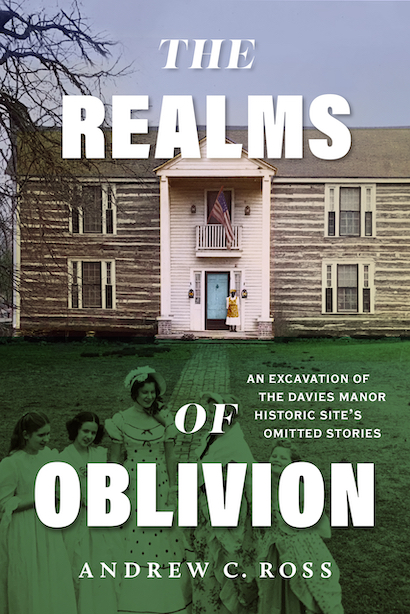Overcoming the Divide
David Dark is still questioning everything
In his 2009 book The Sacredness of Questioning Everything, David Dark urged his readers to “submit everything we’re up to, at work and at play, to the discipline of sacred questioning.” He’s taken that advice to heart in his subsequent books, and now he’s carried the interrogation process a step further by revisiting 2016’s Life’s Too Short to Pretend You’re Not Religious, offering a “reframed and expanded” new edition.
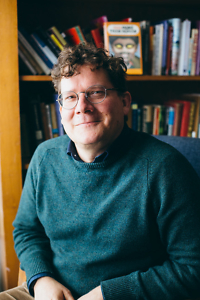 The essence of Life’s Too Short can be found in a line that appears in both versions of the book: “Our real sense of what’s really sacred is regularly on display.” There is, in Dark’s view, no escaping our sacred selves or our intersections with the sacred in others. He’s now considering that idea anew during a time when “something is being revealed (or shaken loose) when it comes to our relationship with institutionalized power, which of course is our relationship with ourselves and the natural world.”
The essence of Life’s Too Short can be found in a line that appears in both versions of the book: “Our real sense of what’s really sacred is regularly on display.” There is, in Dark’s view, no escaping our sacred selves or our intersections with the sacred in others. He’s now considering that idea anew during a time when “something is being revealed (or shaken loose) when it comes to our relationship with institutionalized power, which of course is our relationship with ourselves and the natural world.”
Dark, a Nashville native, teaches in the College of Theology at Belmont University and at the Tennessee Prison for Women. He answered questions from Chapter 16 by email.
Chapter 16: It’s fair to say that a lot has happened since Life’s Too Short was first published in January 2016, but the book never seemed intended to speak to a particular moment. Why did you feel the need to revise it now?
David Dark: At 53 and existing in a context where changing my mind out loud doesn’t threaten my positions (classroom teacher, tenured faculty, and public writer-talker), I’m energized at the prospect of revising my public words. It’s also the case that Intervarsity Press took the 2016 version out of print. I was saddened, but I also saw an opportunity to revisit a text that hadn’t landed the way I’d hoped it would in some circles, to change what was beginning to feel like a slightly bullying posture, and to make my work less useful to the strategies of abusive people. I refer here to Christian supremacists who, I was made to see before and after the January 6th insurrection, are often partnered — and sometimes synonymous — with proponents of the Big Lie about the 2020 presidential election.
By “Christian supremacists,” I mean people who can’t (or won’t) accept that there are people who not only will not but must not become Christian. If I think a person isn’t as whole or healthy or complete or trustworthy as can be until they become Christian, I’m a Christian supremacist. I didn’t have those words (Christian supremacist) available to me in 2016. I find it morally necessary to say the words rather frequently these days. As far as I can tell, they name the abusive position held by numerous people in power within and beyond Tennessee. It isn’t just anti-Semitism, but it’s at least that.
Chapter 16: The idea of religion as “perceived necessity” is central to the book, and the word “perceived” seems designed to upend conventional notions of religion, which don’t usually leave much room for subjectivity or relativism. In your view, is all religion relative? Are there any absolutes?
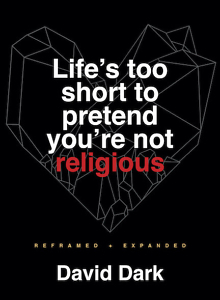 Dark: Whatever we have in mind when we speak of religion is certainly relative to context. I find it helpful to distinguish between good and bad, true and false religion. Like culture, it comes in many forms. I suppose there are what I think of as absolutes across cultures, such as the imperative to not do to someone else what I’d hate to have done to me. True religion, it has been alleged, is looking after the orphaned, the widowed, and the marginalized. I like the sound of that because it need not have anything to do with believing (or not believing) in God. Defining religion as “perceived necessity” broadens the concept to include all human activity. It also makes way for affirmations like this: Whatever lore helps you love yourself and others more is lore enough.
Dark: Whatever we have in mind when we speak of religion is certainly relative to context. I find it helpful to distinguish between good and bad, true and false religion. Like culture, it comes in many forms. I suppose there are what I think of as absolutes across cultures, such as the imperative to not do to someone else what I’d hate to have done to me. True religion, it has been alleged, is looking after the orphaned, the widowed, and the marginalized. I like the sound of that because it need not have anything to do with believing (or not believing) in God. Defining religion as “perceived necessity” broadens the concept to include all human activity. It also makes way for affirmations like this: Whatever lore helps you love yourself and others more is lore enough.
Chapter 16: “Spiritual abuse” is a term you use pretty often, but I’m not entirely certain what you mean by it. What separates it from ordinary manipulation and gaslighting?
Dark: I think plain old abuse becomes spiritual abuse the moment I speak or act as if I’m an authority in someone else’s experience. It’s subtle but sometimes not at all subtle. It’s a refusal to honor another person’s boundaries because I believe (or wish to imply) that I’m closer to God or more intimately familiar with God’s purposes than someone else. It’s a form of violence, whether in speech or behavior, in which I try to deny someone the right to assess their own thoughts, feelings, or experiences without me or, more broadly, apart from the community or tradition I imagine I’m adhering or being true to.
I don’t have to be conscious of it to be guilty of it. These days, as I try to make sense of the bad behavior of so many pastors, pundits, and elected officials in Tennessee (people I’ve known for most of my life), I’ve come to see that those whose spirits have been crushed by spiritual abuse often mimic the very behaviors they were taught to think of as faithfulness and integrity. It’s ugly as hell.
Chapter 16: There’s a common argument that religion and politics can and should be separate, but you write that they’re often “two words for one thing.” Can you explain what you mean by that?
Dark: You bet. I worry over the way unexamined abstractions (religion, politics, media) can serve as a tool for blaming most everything and anything — including my own behavior — on someone else. The essential questions (Who is my neighbor? What do we owe each other? How do I go about enjoying my own life?) are all ineluctably religious and political. I’m interested in undertaking analysis that shows relationships rather than obscuring them. Every fact is a function of relationship. Our preferred divisions sometimes sideline this insight. How we divide determines what we see. I’m trying to overcome the divide to see and speak clearly concerning the threats and possibilities we face.
Chapter 16: You write, “When we label people, we no longer have to deal with them thoughtfully.” You also acknowledge the importance of naming things, and at one point say bluntly that “a lot of us are beginning to realize that we’ve been tied to a network of bigots for most of our lives.” What’s the difference between labeling and naming?
Dark: This is a lovely question. Labels, it seems to me, don’t work on persons because a person is a process. I can’t fix on a person because they’re always more than whatever I think I have in mind, even when, for instance, I call them bigots. Nobody’s just a bigot. But … I nevertheless feel compelled to speak of networks of bigots, especially in recent years, because we have to name what’s happening. We have to name the public safety threats posed by bigots and those who coddle them. I don’t think anybody wants to be a bigot, but I know feelingly what bigoted speech, behavior, and legislation are doing to us. We have to name it as bigotry the better to stand up to, resist, and overcome it. Otherwise, we normalize it. And it’s clear to me that, in a deep sense, we become what we normalize.
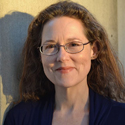
Maria Browning is a fifth-generation Tennessean who grew up in Erin and Nashville. Her work has appeared in Guernica, The Los Angeles Review of Books, Literary Hub, and The New York Times. She’s the editor of Chapter 16.

